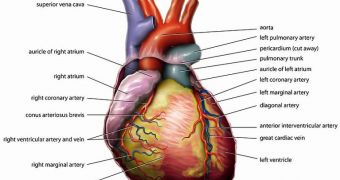A group of investigators has recently determined that a gene can be directly tied to an increased risk of developing a serious heart condition called dilated cardiomyopathy.
In people whose bodies expressed the gene, the risk of developing the disorder was boosted by an estimated 50 percent, say investigators from the University of Regensburg.
In a recent scientific paper, the group reveals that the cardiovascular heat shock protein gene HSPB7 is responsible for underlying this vulnerability to developing the conditions.
This investigation is very important because it addresses a condition that affects 6 in 100,000 people every year. Men are especially predisposed to developing dilated cardiomyopathy.
A research paper detailing the new findings will appear in the October 28 issue of the open-access, peer-reviewed scientific journal PLoS Genetics, a publication of the Public Library of Science.
The work was conducted by UR researchers Klaus Stark and Christian Hengstenberg. The experts say that the condition often leads to chronic heart failure, via indirect mechanisms.
What the disorder does is it enlarges and subsequently weakens the human heart. As a direct result, the pumping capacity of the organ decreases substantially. Over time, the heart simply stops functioning.
One of the things that always puzzled researchers about this condition is that they knew of no potential cause to underlie it in most cases, e! Science News reports.
In some instances, inherited mutations affecting the muscle cells of the heart were found to be at fault, but this mechanism only accounted for a small portion of DCM cases worldwide.
The new investigation was conducted precisely so that experts could pinpoint risk alleles for non-familial forms of the disease.
Researchers from around the world were involved in the effort which sought to gage how common gene variants could contribute to making the heart susceptible to developing this form of cardiomyopathy.
Using some 5,500 test subjects, a large-scale genetic association study was conducted, and HSPB7 stood out from the crowd almost immediately.
At this point, the research team concedes, genetic tests against DCM are impossible using this gene, but the conclusions do pave the way for more relevant researches in this field in the near future.

 14 DAY TRIAL //
14 DAY TRIAL //